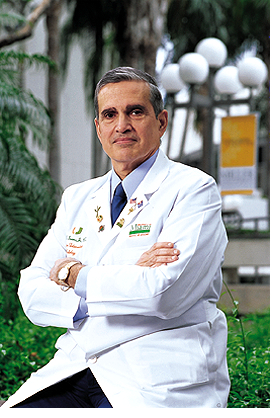Communicating Through the Malpractice Crisis
![]() n
1992 the Robert Wood Johnson Foundation issued a comprehensive report
on medical malpractice. One point made then was that “the medical
malpractice issue has a ‘Catch-22’ that reformers must overcome
if they are to be successful.
n
1992 the Robert Wood Johnson Foundation issued a comprehensive report
on medical malpractice. One point made then was that “the medical
malpractice issue has a ‘Catch-22’ that reformers must overcome
if they are to be successful.
 When no malpractice crisis
exists, there is no interest in changing the system. And yet when a
crisis does exist, the push is
to limit monetary awards, not to
make fundamental changes.” This same dilemma continues to shape decision
making now. We at the University of Miami Leonard M. Miller School of Medicine
have been adversely affected by the current medical-legal entanglement in which
we physicians practice. We have spent a great deal of time trying to fight
medical malpractice from a legislative perspective. Now we physicians must
also do our
part to untangle this knot from within.
When no malpractice crisis
exists, there is no interest in changing the system. And yet when a
crisis does exist, the push is
to limit monetary awards, not to
make fundamental changes.” This same dilemma continues to shape decision
making now. We at the University of Miami Leonard M. Miller School of Medicine
have been adversely affected by the current medical-legal entanglement in which
we physicians practice. We have spent a great deal of time trying to fight
medical malpractice from a legislative perspective. Now we physicians must
also do our
part to untangle this knot from within.
Many studies have shown that poor communication between physicians, patients, and patients’ families promotes the initiation of malpractice lawsuits. But lately, several studies have shown that something as simple as an apology can significantly reduce the number of lawsuits filed.
Physicians have always known the importance of good communication. But we may have forgotten why communication is so critical.
As much as 40 percent of what you discuss with a patient is forgotten by that patient one hour later. But which 40 percent have they forgotten? And what have you forgotten to tell the patient? Clear explanations, frank discussion, and detailed record keeping will help eliminate any “he said-she said” misunderstandings—as well as help you, as a physician, better understand how to talk to your patients.
 For example, as an interventional
radiologist, the vast majority of my patient procedures are performed
while the patient
is sedated but not
asleep. Therefore,
it’s critical to establish a rapport with the patient and his family before
a procedure. A hurried, ten-second informed consent can feel threatening and
stressful to a patient. Conversely, a detailed consent discussion can enhance
a patient’s recovery and reduce the need for sedation.
For example, as an interventional
radiologist, the vast majority of my patient procedures are performed
while the patient
is sedated but not
asleep. Therefore,
it’s critical to establish a rapport with the patient and his family before
a procedure. A hurried, ten-second informed consent can feel threatening and
stressful to a patient. Conversely, a detailed consent discussion can enhance
a patient’s recovery and reduce the need for sedation.
Of course, there is an economic benefit to increased communication. If you’re not affable to your patients, you’re going to lose them. If you avoid questions, it may seem that you have something to hide. And if a patient feels you’re trying to hide something, the patient or the patient’s family is going to think you’ve done something inappropriate.
There will always be instances where the provider does everything right and gets sued—and loses that suit—despite every good intention. But we cannot continue to practice medicine with the mindset that we will be sued no matter what we do. We can do something to diminish those situations most of the time. Availability, affability, and ability combined all help to strengthen a relationship with a patient. Ability alone is often not enough. A little behavioral modification can go a long way.
The current system of medical malpractice works neither for the patient nor the provider. An often-cited Harvard Medical Practice study showed that one out of every eight patients truly affected by malpractice filed a malpractice lawsuit, and only half of those who filed received compensation. Lawsuits can drag on for years and are a burden to both physician and patient, so why not do everything in our power to avoid that morass? The Miller School of Medicine is doing its part by investing time and resources into the Center for Patient Safety and the Office of Patient Protection and Risk Prevention. It’s time for physicians to do their part. It may be as simple as showing that you understand and expressing your heartfelt regrets when appropriate.